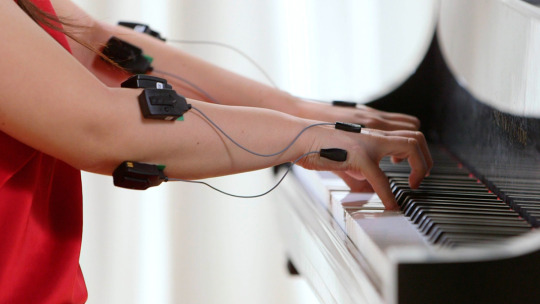#Technology Accessibility
Text
Future of Neurotechnology in Post - Neuralink Era!
Future of Neurotechnology in Post-Neuralink Era!
@neosciencehub
#neosciencehub #science #neurotechnology #neuralink #braincomputer #neurological #brainchip #NeuralinkDevelopment #DataSecurity #ArtificialIntelligence #AITech #HumanAI #NSH #Innovations
The successful human implantation of Neuralink’s brain-computer interface marks a watershed moment in the field of Neurotechnology. This achievement not only demonstrates the immense potential of merging human cognition with artificial intelligence but also sets the stage for a future filled with extraordinary possibilities and challenges. NSH’s special report is to explore what lies ahead in the…

View On WordPress
#artificial intelligence#Brain-Computer Interface Advancements#Cognitive Enhancement#Cognitive Privacy#Ethical Implications#featured#Future of Neurotechnology#Human Rights in Tech#Human-AI Symbiosis#Mental Health Tech#Neuralink#Neuralink Developments#Neurological Data Security#Neurological Disorder Treatments#Neurotech Challenges#Regulatory Frameworks#sciencenews#Technology Accessibility
0 notes
Text


today I learned about "thumb book holders" in my search for ways to read giant fantasy paperbacks without injuring myself, and then I realized I could make one out of the 20-year-old polymer clay that I had lying around... so I did.
and god DAMN it's more effective than I ever expected, so I thought everyone should know about them. You can get really cheap mass-produced ones but this was fun to make and I'll probably make more ᕕ( ᐛ )ᕗ
#crafts#thumb book holder#i made it to look like marbled redware#accessibility#disability#assistive technology
8K notes
·
View notes
Note
CDs are obsolete because the sound quality sucks
yeah sucks me good and hard through my jorts
#okay in actuality?????? vinyl is inaccessible in so so many ways.#cant afford a decnt record player which means that the vinyl i DO own is uhhh soumds worse than#my cds theough the blutooth speaker i have#cds arent 'better' than vinyl but theyre an affordable access point#and wonderful technology#and for the majority of people cd sound is better than spotify or youtubemp3#they didnt go obselete bc they sucked they went obselete (to the extent they did) bc of digitization#it ALL depends on what speakers you are playing things through#cds are LITERALLY lossless like?????#cd quality is usuallly better than vinyl cd quality is better than anything but flac#bc flac is MODELED ON CDS#ask bosk
7K notes
·
View notes
Text
Autoenshittification

Forget F1: the only car race that matters now is the race to turn your car into a digital extraction machine, a high-speed inkjet printer on wheels, stealing your private data as it picks your pocket. Your car’s digital infrastructure is a costly, dangerous nightmare — but for automakers in pursuit of postcapitalist utopia, it’s a dream they can’t give up on.
Your car is stuffed full of microchips, a fact the world came to appreciate after the pandemic struck and auto production ground to a halt due to chip shortages. Of course, that wasn’t the whole story: when the pandemic started, the automakers panicked and canceled their chip orders, only to immediately regret that decision and place new orders.
But it was too late: semiconductor production had taken a serious body-blow, and when Big Car placed its new chip orders, it went to the back of a long, slow-moving line. It was a catastrophic bungle: microchips are so integral to car production that a car is basically a computer network on wheels that you stick your fragile human body into and pray.
The car manufacturers got so desperate for chips that they started buying up washing machines for the microchips in them, extracting the chips and discarding the washing machines like some absurdo-dystopian cyberpunk walnut-shelling machine:
https://www.autoevolution.com/news/desperate-times-companies-buy-washing-machines-just-to-rip-out-the-chips-187033.html
These digital systems are a huge problem for the car companies. They are the underlying cause of a precipitous decline in car quality. From touch-based digital door-locks to networked sensors and cameras, every digital system in your car is a source of endless repair nightmares, costly recalls and cybersecurity vulnerabilities:
https://www.reuters.com/business/autos-transportation/quality-new-vehicles-us-declining-more-tech-use-study-shows-2023-06-22/
What’s more, drivers hate all the digital bullshit, from the janky touchscreens to the shitty, wildly insecure apps. Digital systems are drivers’ most significant point of dissatisfaction with the automakers’ products:
https://www.theverge.com/23801545/car-infotainment-customer-satisifaction-survey-jd-power
Even the automakers sorta-kinda admit that this is a problem. Back in 2020 when Massachusetts was having a Right-to-Repair ballot initiative, Big Car ran these unfuckingbelievable scare ads that basically said, “Your car spies on you so comprehensively that giving anyone else access to its systems will let murderers stalk you to your home and kill you:
https://pluralistic.net/2020/09/03/rip-david-graeber/#rolling-surveillance-platforms
But even amid all the complaining about cars getting stuck in the Internet of Shit, there’s still not much discussion of why the car-makers are making their products less attractive, less reliable, less safe, and less resilient by stuffing them full of microchips. Are car execs just the latest generation of rubes who’ve been suckered by Silicon Valley bullshit and convinced that apps are a magic path to profitability?
Nope. Car execs are sophisticated businesspeople, and they’re surfing capitalism’s latest — and last — hot trend: dismantling capitalism itself.
Now, leftists have been predicting the death of capitalism since The Communist Manifesto, but even Marx and Engels warned us not to get too frisky: capitalism, they wrote, is endlessly creative, constantly reinventing itself, re-emerging from each crisis in a new form that is perfectly adapted to the post-crisis reality:
https://www.nytimes.com/2022/10/31/books/review/a-spectre-haunting-china-mieville.html
But capitalism has finally run out of gas. In his forthcoming book, Techno Feudalism: What Killed Capitalism, Yanis Varoufakis proposes that capitalism has died — but it wasn’t replaced by socialism. Rather, capitalism has given way to feudalism:
https://www.penguin.co.uk/books/451795/technofeudalism-by-varoufakis-yanis/9781847927279
Under capitalism, capital is the prime mover. The people who own and mobilize capital — the capitalists — organize the economy and take the lion’s share of its returns. But it wasn’t always this way: for hundreds of years, European civilization was dominated by rents, not markets.
A “rent” is income that you get from owning something that other people need to produce value. Think of renting out a house you own: not only do you get paid when someone pays you to live there, you also get the benefit of rising property values, which are the result of the work that all the other homeowners, business owners, and residents do to make the neighborhood more valuable.
The first capitalists hated rent. They wanted to replace the “passive income” that landowners got from taxing their serfs’ harvest with active income from enclosing those lands and grazing sheep in order to get wool to feed to the new textile mills. They wanted active income — and lots of it.
Capitalist philosophers railed against rent. The “free market” of Adam Smith wasn’t a market that was free from regulation — it was a market free from rents. The reason Smith railed against monopolists is because he (correctly) understood that once a monopoly emerged, it would become a chokepoint through which a rentier could cream off the profits he considered the capitalist’s due:
https://locusmag.com/2021/03/cory-doctorow-free-markets/
Today, we live in a rentier’s paradise. People don’t aspire to create value — they aspire to capture it. In Survival of the Richest, Doug Rushkoff calls this “going meta”: don’t provide a service, just figure out a way to interpose yourself between the provider and the customer:
https://pluralistic.net/2022/09/13/collapse-porn/#collapse-porn
Don’t drive a cab, create Uber and extract value from every driver and rider. Better still: don’t found Uber, invest in Uber options and extract value from the people who invest in Uber. Even better, invest in derivatives of Uber options and extract value from people extracting value from people investing in Uber, who extract value from drivers and riders. Go meta.
This is your brain on the four-hour-work-week, passive income mind-virus. In Techno Feudalism, Varoufakis deftly describes how the new “Cloud Capital” has created a new generation of rentiers, and how they have become the richest, most powerful people in human history.
Shopping at Amazon is like visiting a bustling city center full of stores — but each of those stores’ owners has to pay the majority of every sale to a feudal landlord, Emperor Jeff Bezos, who also decides which goods they can sell and where they must appear on the shelves. Amazon is full of capitalists, but it is not a capitalist enterprise. It’s a feudal one:
https://pluralistic.net/2022/11/28/enshittification/#relentless-payola
This is the reason that automakers are willing to enshittify their products so comprehensively: they were one of the first industries to decouple rents from profits. Recall that the reason that Big Car needed billions in bailouts in 2008 is that they’d reinvented themselves as loan-sharks who incidentally made cars, lending money to car-buyers and then “securitizing” the loans so they could be traded in the capital markets.
Even though this strategy brought the car companies to the brink of ruin, it paid off in the long run. The car makers got billions in public money, paid their execs massive bonuses, gave billions to shareholders in buybacks and dividends, smashed their unions, fucked their pensioned workers, and shipped jobs anywhere they could pollute and murder their workforce with impunity.
Car companies are on the forefront of postcapitalism, and they understand that digital is the key to rent-extraction. Remember when BMW announced that it was going to rent you the seatwarmer in your own fucking car?
https://pluralistic.net/2020/07/02/big-river/#beemers
Not to be outdone, Mercedes announced that they were going to rent you your car’s accelerator pedal, charging an extra $1200/year to unlock a fully functional acceleration curve:
https://www.theverge.com/2022/11/23/23474969/mercedes-car-subscription-faster-acceleration-feature-price
This is the urinary tract infection business model: without digitization, all your car’s value flowed in a healthy stream. But once the car-makers add semiconductors, each one of those features comes out in a painful, burning dribble, with every button on that fakakta touchscreen wired directly into your credit-card.
But it’s just for starters. Computers are malleable. The only computer we know how to make is the Turing Complete Von Neumann Machine, which can run every program we know how to write. Once they add networked computers to your car, the Car Lords can endlessly twiddle the knobs on the back end, finding new ways to extract value from you:
https://doctorow.medium.com/twiddler-1b5c9690cce6
That means that your car can track your every movement, and sell your location data to anyone and everyone, from marketers to bounty-hunters looking to collect fees for tracking down people who travel out of state for abortions to cops to foreign spies:
https://www.vice.com/en/article/n7enex/tool-shows-if-car-selling-data-privacy4cars-vehicle-privacy-report
Digitization supercharges financialization. It lets car-makers offer subprime auto-loans to desperate, poor people and then killswitch their cars if they miss a payment:
https://www.youtube.com/watch?v=4U2eDJnwz_s
Subprime lending for cars would be a terrible business without computers, but digitization makes it a great source of feudal rents. Car dealers can originate loans to people with teaser rates that quickly blow up into payments the dealer knows their customer can’t afford. Then they repo the car and sell it to another desperate person, and another, and another:
https://pluralistic.net/2022/07/27/boricua/#looking-for-the-joke-with-a-microscope
Digitization also opens up more exotic options. Some subprime cars have secondary control systems wired into their entertainment system: miss a payment and your car radio flips to full volume and bellows an unstoppable, unmutable stream of threats. Tesla does one better: your car will lock and immobilize itself, then blare its horn and back out of its parking spot when the repo man arrives:
https://tiremeetsroad.com/2021/03/18/tesla-allegedly-remotely-unlocks-model-3-owners-car-uses-smart-summon-to-help-repo-agent/
Digital feudalism hasn’t stopped innovating — it’s just stopped innovating good things. The digital device is an endless source of sadistic novelties, like the cellphones that disable your most-used app the first day you’re late on a payment, then work their way down the other apps you rely on for every day you’re late:
https://restofworld.org/2021/loans-that-hijack-your-phone-are-coming-to-india/
Usurers have always relied on this kind of imaginative intimidation. The loan-shark’s arm-breaker knows you’re never going to get off the hook; his goal is in intimidating you into paying his boss first, liquidating your house and your kid’s college fund and your wedding ring before you default and he throws you off a building.
Thanks to the malleability of computerized systems, digital arm-breakers have an endless array of options they can deploy to motivate you into paying them first, no matter what it costs you:
https://pluralistic.net/2021/04/02/innovation-unlocks-markets/#digital-arm-breakers
Car-makers are trailblazers in imaginative rent-extraction. Take VIN-locking: this is the practice of adding cheap microchips to engine components that communicate with the car’s overall network. After a new part is installed in your car, your car’s computer does a complex cryptographic handshake with the part that requires an unlock code provided by an authorized technician. If the code isn’t entered, the car refuses to use that part.
VIN-locking has exploded in popularity. It’s in your iPhone, preventing you from using refurb or third-party replacement parts:
https://doctorow.medium.com/apples-cement-overshoes-329856288d13
It’s in fuckin’ ventilators, which was a nightmare during lockdown as hospital techs nursed their precious ventilators along by swapping parts from dead systems into serviceable ones:
https://www.vice.com/en/article/3azv9b/why-repair-techs-are-hacking-ventilators-with-diy-dongles-from-poland
And of course, it’s in tractors, along with other forms of remote killswitch. Remember that feelgood story about John Deere bricking the looted Ukrainian tractors whose snitch-chips showed they’d been relocated to Russia?
https://doctorow.medium.com/about-those-kill-switched-ukrainian-tractors-bc93f471b9c8
That wasn’t a happy story — it was a cautionary tale. After all, John Deere now controls the majority of the world’s agricultural future, and they’ve boobytrapped those ubiquitous tractors with killswitches that can be activated by anyone who hacks, takes over, or suborns Deere or its dealerships.
Control over repair isn’t limited to gouging customers on parts and service. When a company gets to decide whether your device can be fixed, it can fuck you over in all kinds of ways. Back in 2019, Tim Apple told his shareholders to expect lower revenues because people were opting to fix their phones rather than replace them:
https://www.apple.com/newsroom/2019/01/letter-from-tim-cook-to-apple-investors/
By usurping your right to decide who fixes your phone, Apple gets to decide whether you can fix it, or whether you must replace it. Problem solved — and not just for Apple, but for car makers, tractor makers, ventilator makers and more. Apple leads on this, even ahead of Big Car, pioneering a “recycling” program that sees trade-in phones shredded so they can’t possibly be diverted from an e-waste dump and mined for parts:
https://www.vice.com/en/article/yp73jw/apple-recycling-iphones-macbooks
John Deere isn’t sleeping on this. They’ve come up with a valuable treasure they extract when they win the Right-to-Repair: Deere singles out farmers who complain about its policies and refuses to repair their tractors, stranding them with six-figure, two-ton paperweight:
https://pluralistic.net/2022/05/31/dealers-choice/#be-a-shame-if-something-were-to-happen-to-it
The repair wars are just a skirmish in a vast, invisible fight that’s been waged for decades: the War On General-Purpose Computing, where tech companies use the law to make it illegal for you to reconfigure your devices so they serve you, rather than their shareholders:
https://memex.craphound.com/2012/01/10/lockdown-the-coming-war-on-general-purpose-computing/
The force behind this army is vast and grows larger every day. General purpose computers are antithetical to technofeudalism — all the rents extracted by technofeudalists would go away if others (tinkereres, co-ops, even capitalists!) were allowed to reconfigure our devices so they serve us.
You’ve probably noticed the skirmishes with inkjet printer makers, who can only force you to buy their ink at 20,000% markups if they can stop you from deciding how your printer is configured:
https://pluralistic.net/2022/08/07/inky-wretches/#epson-salty
But we’re also fighting against insulin pump makers, who want to turn people with diabetes into walking inkjet printers:
https://pluralistic.net/2022/06/10/loopers/#hp-ification
And companies that make powered wheelchairs:
https://pluralistic.net/2022/06/08/chair-ish/#r2r
These companies start with people who have the least agency and social power and wreck their lives, then work their way up the privilege gradient, coming for everyone else. It’s called the “shitty technology adoption curve”:
https://pluralistic.net/2022/08/21/great-taylors-ghost/#solidarity-or-bust
Technofeudalism is the public-private-partnership from hell, emerging from a combination of state and private action. On the one hand, bailing out bankers and big business (rather than workers) after the 2008 crash and the covid lockdown decoupled income from profits. Companies spent billions more than they earned were still wildly profitable, thanks to those public funds.
But there’s also a policy dimension here. Some of those rentiers’ billions were mobilized to both deconstruct antitrust law (allowing bigger and bigger companies and cartels) and to expand “IP” law, turning “IP” into a toolsuite for controlling the conduct of a firm’s competitors, critics and customers:
https://locusmag.com/2020/09/cory-doctorow-ip/
IP is key to understanding the rise of technofeudalism. The same malleability that allows companies to “twiddle” the knobs on their services and keep us on the hook as they reel us in would hypothetically allow us to countertwiddle, seizing the means of computation:
https://pluralistic.net/2023/04/12/algorithmic-wage-discrimination/#fishers-of-men
The thing that stands between you and an alternative app store, an interoperable social media network that you can escape to while continuing to message the friends you left behind, or a car that anyone can fix or unlock features for is IP, not technology. Under capitalism, that technology would already exist, because capitalists have no loyalty to one another and view each other’s margins as their own opportunities.
But under technofeudalism, control comes from rents (owning things), not profits (selling things). The capitalist who wants to participate in your iPhone’s “ecosystem” has to make apps and submit them to Apple, along with 30% of their lifetime revenues — they don’t get to sell you jailbreaking kit that lets you choose their app store.
Rent-seeking technology has a holy grail: control over “ring zero” — the ability to compel you to configure your computer to a feudalist’s specifications, and to verify that you haven’t altered your computer after it came into your possession:
https://pluralistic.net/2022/01/30/ring-minus-one/#drm-political-economy
For more than two decades, various would-be feudal lords and their court sorcerers have been pitching ways of doing this, of varying degrees of outlandishness.
At core, here’s what they envision: inside your computer, they will nest another computer, one that is designed to run a very simple set of programs, none of which can be altered once it leaves the factory. This computer — either a whole separate chip called a “Trusted Platform Module” or a region of your main processor called a secure enclave — can tally observations about your computer: which operating system, modules and programs it’s running.
Then it can cryptographically “sign” these observations, proving that they were made by a secure chip and not by something you could have modified. Then you can send this signed “attestation” to someone else, who can use it to determine how your computer is configured and thus whether to trust it. This is called “remote attestation.”
There are some cool things you can do with remote attestation: for example, two strangers playing a networked video game together can use attestations to make sure neither is running any cheat modules. Or you could require your cloud computing provider to use attestations that they aren’t stealing your data from the server you’re renting. Or if you suspect that your computer has been infected with malware, you can connect to someone else and send them an attestation that they can use to figure out whether you should trust it.
Today, there’s a cool remote attestation technology called “PrivacyPass” that replaces CAPTCHAs by having you prove to your own device that you are a human. When a server wants to make sure you’re a person, it sends a random number to your device, which signs that number along with its promise that it is acting on behalf of a human being, and sends it back. CAPTCHAs are all kinds of bad — bad for accessibility and privacy — and this is really great.
But the billions that have been thrown at remote attestation over the decades is only incidentally about solving CAPTCHAs or verifying your cloud server. The holy grail here is being able to make sure that you’re not running an ad-blocker. It’s being able to remotely verify that you haven’t disabled the bossware your employer requires. It’s the power to block someone from opening an Office365 doc with LibreOffice. It’s your boss’s ability to ensure that you haven’t modified your messaging client to disable disappearing messages before he sends you an auto-destructing memo ordering you to break the law.
And there’s a new remote attestation technology making the rounds: Google’s Web Environment Integrity, which will leverage Google’s dominance over browsers to allow websites to block users who run ad-blockers:
https://github.com/RupertBenWiser/Web-Environment-Integrity
There’s plenty else WEI can do (it would make detecting ad-fraud much easier), but for every legitimate use, there are a hundred ways this could be abused. It’s a technology purpose-built to allow rent extraction by stripping us of our right to technological self-determination.
Releasing a technology like this into a world where companies are willing to make their products less reliable, less attractive, less safe and less resilient in pursuit of rents is incredibly reckless and shortsighted. You want unauthorized bread? This is how you get Unauthorized Bread:
https://arstechnica.com/gaming/2020/01/unauthorized-bread-a-near-future-tale-of-refugees-and-sinister-iot-appliances/amp/

If you'd like an essay-formatted version of this thread to read or share, here's a link to it on pluralistic.net, my surveillance-free, ad-free, tracker-free blog:
https://pluralistic.net/2023/07/24/rent-to-pwn/#kitt-is-a-demon

[Image ID: The interior of a luxury car. There is a dagger protruding from the steering wheel. The entertainment console has been replaced by the text 'You wouldn't download a car,' in MPAA scare-ad font. Outside of the windscreen looms the Matrix waterfall effect. Visible in the rear- and side-view mirror is the driver: the figure from Munch's 'Scream.' The screen behind the steering-wheel has been replaced by the menacing red eye of HAL9000 from Stanley Kubrick's '2001: A Space Odyssey.']

Image:
Cryteria (modified)
https://commons.wikimedia.org/wiki/File:HAL9000.svg
CC BY 3.0
https://creativecommons.org/licenses/by/3.0/deed.en
#pluralistic#shitty technology adoption curve#unauthorized bread#automotive#arm-breakers#cars#big car#right to repair#rent-seeking#digital feudalism#neofeudalism#drm#wei#remote attestation#private access tokens#yannis varoufakis#web environment integrity#paternalism#war on general purpose computing#competitive compatibility#google#enshittification#interoperability#adversarial interoperability#comcom#the internet con#postcapitalism#ring zero#care#med-tech
4K notes
·
View notes
Text

For the Benefit of All: Assistive Tech Developed from NASA Tech
What do modern cochlear implants and robotic gloves have in common? They were derived from NASA technology. We’ve made it easier to find and use our patented inventions that could help create products that enhance life for people with disabilities.
October is National Disability Employment Awareness Month, which highlights the contributions of American workers with disabilities – many of whom use assistive technology on the job. Take a look at these assistive technologies that are NASA spinoffs.

Low-Vision Headsets
The Joint Optical Reflective Display (JORDY) device is a headset that uses NASA image processing and head-mounted display technology to enable people with low vision to read and write. JORDY enhances individuals’ remaining sight by magnifying objects up to 50 times and allowing them to change contrast, brightness, and display modes. JORDY's name was inspired by Geordi La Forge, a blind character from “Star Trek: The Next Generation” whose futuristic visor enabled him to see.

Cochlear Implants
Work that led to the modern cochlear implant was patented by a NASA engineer in the 1970s. Following three failed corrective surgeries, Adam Kissiah combined his NASA electronics know-how with research in the Kennedy Space Center technical library to build his own solution for people with severe-to-profound hearing loss who receive little or no benefit from hearing aids. Several companies now make the devices, which have been implanted in hundreds of thousands of people around the world.

Robotic Gloves
Ironhand, from Swedish company Bioservo Technologies, is the world’s first industrial-strength robotic glove for factory workers and others who perform repetitive manual tasks. It helps prevent stress injuries but has been especially warmly received by workers with preexisting hand injuries and conditions. The glove is based on a suite of patents for the technology developed by NASA and General Motors to build the hands of the Robonaut 2 humanoid robotic astronaut.

Smart Glasses
Neurofeedback technology NASA originally developed to improve pilots’ attention has been the basis for products aimed at helping people manage attention disorders without medication. The devices measure brainwave output to gauge attention levels according to the “engagement index” a NASA engineer created. Then, they show the results to users, helping them learn to voluntarily control their degree of concentration. One such device is a pair of smart glasses from Narbis, whose lenses darken as attention wanes.

Anti-Gravity Treadmills
A NASA scientist who developed ways to use air pressure to simulate gravity for astronauts exercising in space had the idea to apply the concept for the opposite effect on Earth. After licensing his technology, Alter-G Inc. developed its anti-gravity G-Trainer treadmill, which lets users offload some or all of their weight while exercising. The treadmills can help people recover from athletic or brain injuries, and they allow a safe exercise regimen for others with long-term conditions such as arthritis.

Wireless Muscle Sensors
Some of the most exciting assistive technologies to spin off may be yet to come. Delsys Inc. developed electromyographic technology to help NASA understand the effects of long-term weightlessness on astronauts’ muscles and movements. Electromyography detects and analyzes electrical signals emitted when motor nerves trigger movement. Among the company’s customers are physical therapists developing exercise routines to help patients recover from injuries. But some researchers are using the technology to attempt recoveries that once seemed impossible, such as helping paralyzed patients regain movement, letting laryngectomy patients speak, and outfitting amputees with artificial limbs that work like the real thing.
To further enhance the lives of people with disabilities, NASA has identified a selection of patented technologies created for space missions that could spur the next generation of assistive technology here on Earth.
Want to learn more about assistive technologies already in action? Check out NASA Spinoff to find products and services that wouldn’t exist without space exploration.
Make sure to follow us on Tumblr for your regular dose of space!
#NASA#space#tech#technology#spinoff#robotics#physical therapy#disability#disabled#accessibility#a11y#inventions
834 notes
·
View notes
Text

#dedenne#beep beep beep beep… phone's ringing it's dedenne from the expedition society#she's here to tell you about some more danger#uh oooooohhh#i think that's what it does. right? beep beep beep. something like that#i don't remember if she's like. calling through the connection orb or just beaming herself into everyone's heads#or if they're wearing earpieces or some shit but the connection orb is the most technological advancement we've seen in all of pmd#and it's only at the expedition society. they're holding all this proprietary tech for themselves and keeping it from the rest of the world#so they can continue to have the advantage. the only organization with the lapras liner to have access to the entire rest of the world#truly a megacorporation of our time
237 notes
·
View notes
Text
My commitment to accessible design in tabletop RPGs remains sincere, but the fact that most popular EPUB readers still don't support CSS variables is truly testing me.
537 notes
·
View notes
Text
I think it would be funny if in season 2 it becomes a running gag of Vox sending spies to the hotel who just end up captured into the net of found family and friendship and become part of the clientele and Vox doesn’t get why he keeps losing contact with them (and assumes Alastor probably killed them) until one day Charlie comes to personally thank him for bringing her so many souls for rehabilitation and for believing in her cause and Vox just. Doesn’t know what is happening. And short circuits.
#I love how the vees are like#so bad at being antagonists that they loop around to actually helping the plot#then charlie offers vox a spot at the hotel if he ever feels he needs#and it takes all of his self-control not to laugh in her face#but#this is an opening#maybe he can see for himself what alastor is up to#(and then my self-indulgent unrealistic brain goes to and then he also gets sucked into the clientele without realizing)#he would die without access to his gamer room of screens tho#and alastor keeps trying to ban his technology from the hotel#but vox just sends charlie one of his pathetic expressions#‘but it reminds me of home’#and charlie folds immediately#allows him some installation of his screens in his own room#yeah I know this is unrealistic but shh#hazbin hotel#hazbin vox
125 notes
·
View notes
Text
i suddenly realised that Rei has to own both a Poryphone and the ArcPhone so that he can use sync moves. having two phones is inconvenient so he takes the SIM card out of the ArcPhone and puts it in the Poryphone

#arcOS is exclusive. high end. ahead of its time#porygon tech is accessible and widely compatible with peripheral technology such as sync stones#Who Would Win#the incredible rabbit holes of thought writing fic leaves you with#rei pokemon#trainer rei#pokemas#// tikposting#rei
70 notes
·
View notes
Text
Five Things Brian Austin Said

In today's Five Things Brian Austin discusses what it's like to code for AO3 and who really needs a hug. Read more at https://otw.news/ef77ef
#organization for transformative works#otw#volunteering#about our volunteers#accessibility design & technology
191 notes
·
View notes
Text

arti but she's a funky moth dragon now
it's really unclear due to bad posing, but she's holding that spear with one of her extra arms. also she's missing a wing.
she's going to be ice element on site, and i think i'm going to just make that canon rather than ignoring site elements. ice-based demolitions will be very fun to play around with
#flight rising#frfanart#/etc/art time#/dragon/artificer#i'll go draw a reference as to how her spear even works#like the thing is. i write scugs as fully sapient characters so here it means i've given them access to modern technology#and by god they are going to use that modern technology#just you wait 'till we get to survivor and monk because oh boy i have plans for those two
97 notes
·
View notes
Text
AI tools for the neurodivergent brain
As AI application starts to expand rapidly in it's uses and abilities, there is an understandable amount of scepticism and discussion about how it can negatively impact how our society develops.
On the flipside of this, I'd like to share a couple of AI tools which I've found incredibly useful. As someone with pretty severe executive disfunction, I've always dreamed about being able to have a personal assistant to help me out when I am struggling.
If you haven't already tried it out, take a look at goblin.tools
This AI tool helps me in so many ways. From finding the right words, assembling ingredients into a meal, checking how my tone comes across in a message, to breaking down overwhelming tasks into manageable steps.
I also really like mymind
It's like a pinterest board, bookmark manager and general braindump tool that has helped me organise all the different projects, ideas and general digital hoarding into one place - that I can actually search and find all the relevant things without agonising over file organisation and bookmark labelling.
If you have trouble with keeping a hundred pinned tabs on your browser like I do, this tool can actually really help letting go of the anxiety of losing those things without the fear you will never come back to it again.
As much as I share some of the trepidation about this powerful new tech and we should definitely keep questioning how it is being rolled out into every facet of our lives - it can also be a very real accessibility aid for neurodivergent folks.
No amount of notebooks, lists, alarms and calendar reminders comes close to how these have helped me with ADHD symptoms.
I'd hate for that to be overlooked in all the backlash against AI in general.
#adult adhd#neurodivergence#neurodiversity#adhd#autism#executive dysfunction#mental health#accessibility#ai#goblin tools#mymind#ai tools#ai technology
248 notes
·
View notes
Text
Assistive devices are part of one's personal space. Always ask for permission before handling a disabled person's assistive device. This includes the less obvious ones like oxygen tanks and communication boards.
In solidarity,
- Aalya
#assistive technology#assistive devices#disabilities#disability#accessibility#inclusion#personal space
170 notes
·
View notes
Text
found 'the way' a really interesting piece of speculative fiction exploring the idea of anti-migrant xenophobic violence being turned inwards towards 'legitimate citizens' when interests of capital are threatened by struggle, but this sequence in the last episode def stood out to me as a neoluddite.
feels connected to this quote from dan mcquillan's 'resisting ai - an anti-fascist approach to artificial intelligence':
Bergson argued that if one accepts a ready- made problem in this way, "one might just as well say that all truth is already virtually known, that its model is patented in the administrative offices of the state, and that philosophy is a jig- saw puzzle where the problem is to construct with the pieces society gives us the design it is unwilling to show us." (Deleuze, 2002, cited in Coleman, 2008)
In other words, however sophisticated or creative AI might seem to be, its modelling is stuck in abstractions drawn from the past, and so becomes a rearrangement of the way things have been rather than a reimagining of the way things could be. AI has, in effect, an inbuilt political commitment to the status quo, in particular to existing structures that embed specific relations of power. The absence of different concepts leaves out the possibility of conceiving that things could be arranged differently.
#the way#the way (2024)#the way 2024#michael sheen#machine learning#artificial intelligence#luddism#look i know everyone is talking about *that scene* but like i think the whole thing is worth an actual watch#clunky and kind of both ham-fisted and politically coy at times but there's a lot of interesting ideas being worked out too#particularly thought it was strong on the ideas of alienation and esp alienated masculinity under capitalism#the role of the myth in the alienated society#surveillance technology obv#and how the rabid xenophobia and racism of capitalist imperialism will always find a scapegoat for its fascist ideology#even among people who had been previously granted access to the 'safe' 'white' group when it suits consolidating & preserving power#oh god and yeah the gothic marxism of it all - the literal ghosts of our militant working-class past
70 notes
·
View notes
Text

ghoulish girlfriends ♡
#(cough) you can get early access to my monster doods by subscribing to my patreon...#(cough) also you can decide what ill draw next...#tma#tma au#centaur georgie#cervid melanie#some lore: since centaurs have the brains and the strength of killer whales humans decided against trying to exterminate them#instead both races cooperate#centaurs dont care about humans very much but they do love their trinkets and technology#cervids are smallers than centaurs so they dont get the same respect from humans#they can definitely still out tank them so its not wise to mess with them#cervids and centaurs are social creatures but melanie decided to retire to the deepest part of the forest on her own#a girl needs some chill
186 notes
·
View notes
Text


Why did I spend multiple hours on this.
From left to right: Chenery (he is crying happy tears), Harcourt, Granby, Little, Ferris, Forthing, Rankin, Tharkay, and Laurence.
#temeraire#temeraire fanart#OK. here we go with the names#chenery temeraire#catherine harcourt#john granby#augustine little#henry ferris#forthing temeraire#lieutenant forthing#jeremy rankin#tenzing tharkay#william laurence#no reason for these particular characters i just. felt like it#my art#I just think that if Laurence had access to technology he would be very old man about it!!!#granby/little#almost forgot to tag that and they are literally kissing HMGNKNK
43 notes
·
View notes